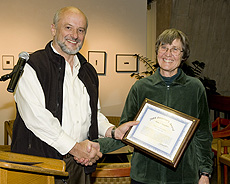Jean Slaughter wins Director's Volunteer Award

Retired physicist Jean Slaughter accepts the Director's Volunteer Award from Fermilab Director Pier Oddone during a ceremony on Nov. 25.
Fermilab Director Pier Oddone awarded retired Fermilab physicist Jean Slaughter the 2008 Director's Volunteer Award for her efforts as a mentor, classroom presenter and trainer of teachers and volunteers. Suzanne Weber and Peter Garbincius also received certificates of appreciation as finalists for the award.
The award is given annually to an employee, user, graduate student, retiree or guest scientist who has significantly contributed to the Education Office's volunteer efforts.
Engineering physicist Sharon Lackey, who chaired the selection panel, said Slaughter was an obvious choice."It's the number of people Jean's affected and the variety of ways she has volunteered over the years," Lackey said.
Slaughter has mentored students and interns at Fermilab since she arrived as a post-doc in 1973. She was one of the first volunteers in the Fermilab Education Office's classroom presentation program, which started in 2005. She has assisted since 2006 with QuarkNet, a program that connects high school students, teachers and physicists.
One reason she started volunteering was to encourage students, especially girls, to consider going into physics. "It's important that they can see that physicists are regular people so they can imagine being a physicist or a scientist themselves," she said.
Slaughter has worked on CDF and a number of other experiments. Although she retired last summer, she still volunteers and is working on the Dark Energy Survey.
In FY2008, through programs including classroom presentations, QuarkNet and the Ask-a-Physicist program, 205 Fermilab volunteers have interacted with about 30,000 students and 2,000 teachers from the surrounding communities.
"Fermilab is an important presence in the educational picture of this region," Oddone said. "That job couldn't be done without an immense number of volunteers."
At the Nov. 25 award ceremony, Oddone presented Slaughter with a plaque and a $1,000 prize, made possible by an anonymous donor.
-- Kathryn Grim
|